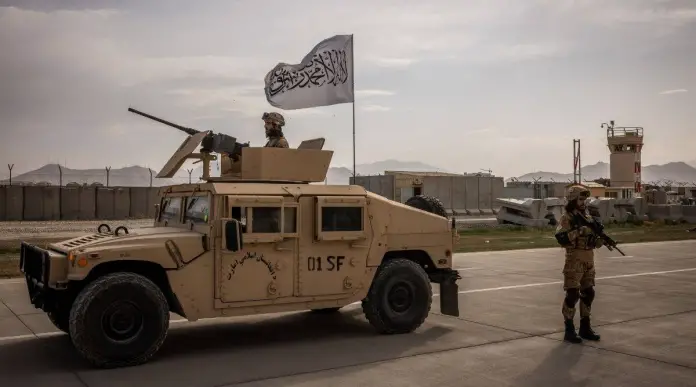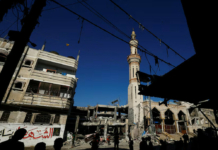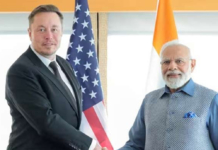Former foreign secretary and ambassador to United States Aizaz Ahmad Chaudhry has said that the only way peace can be achieved in the region is through an Afghan-led and Afghan-owned peace process and countries in the region had the responsibility to facilitate that peace.
Aizaz Chaudhry made these comments in an interview to a foreign media outlet. The interview included a discussion on various topics which included, inter alia, Pakistan’s stance on Afghanistan, its historical ties to the country, resources of Afghanistan, and prospects of governance and stability under Taliban.
Following is the interview of the former ambassador Aizaz Chaudhry with the foreign media outlet.
You wrote recently that Pakistan’s stance on Afghanistan for the last 20 years has been proven accurate, what makes you believe that?
Pakistan always indicated that there should be a political solution in Afghanistan. We think military victory was neither possible nor desirable. For 17 and half years, United States did not believe until we decided to engage in talks with Taliban. We even wanted the Afghan government and other fractions to be associated because we were interested in an inclusive peace as Pakistan has been severely affected by the instability in Afghanistan. I am glad that the political process has finally started, but unfortunately, President Ashraf Ghani did not engage in intra-Afghan talks seriously and the rest is history. Even now, our message to the Taliban should be that there should be an inclusive government; they should take everybody along because what we need is a peaceful Afghanistan.
Let us talk about ties between Pakistan and Afghanistan. We know it is a controversial subject, we all know from a historical experience that the Afghans are fiercely independent and they do not submit easily but it is also known that there is some degree of understanding between Taliban and Pakistan. How big is that understanding or influence in your estimation and how can one talk to Talban so that they listen rather than resist?
The bulk of the Afghan Taliban is and has been in Afghanistan all along. We have been maintaining that there are over three million refugees in Pakistan and sometimes the Taliban do visit Pakistan and that is the only leverage we had on them. Unfortunately, the United States government and the Afghanistan government kept on repeating this mantra that Taliban have sanctuaries in Pakistan which is not a fact and as a result they were using this to justify their lack of success or failure of their military strategy in Afghanistan. Pakistan has been consistently saying that you have to look inside Afghanistan not Pakistan for all the solutions and Pakistan wouldn’t want any proxy or favorites in Afghanistan.
With due respect ambassador, is that really geopolitically honest because all the countries that have security interest in Afghanistan have certain proxy forces there. That makes sense from the point of your both intelligence and security. So how can you claim that Pakistan has none or wouldn’t want to have any proxy while your basic security is so tightly linked to that country?
I think it’s important at this point of time for every country, more so the regional countries and neighbors of Afghanistan to start respecting Afghanistan as an independent and sovereign country. We have seen that interventions first by Soviet Union and then by the United States have wreaked havoc in Afghanistan and I think we should give the people of Afghanistan a break. So, my sense is that there should be no proxies in Afghanistan by any country. I know that India did use Afghanistan’s soil against Pakistan but I am saying that no country should use Afghan soil for any strategic or tactical objectives. That is the best treatment and respect we can give to the people there.
When the Taliban came to power 25 years ago, Pakistan was one of the very few countries to officially recognize them. Do you think history will repeat itself?
I hope it does not because I think the Taliban of yester-years had ultra-conservative ideologies and this time they seem to be more moderate, they have made certain commitments, they have made a commitment that there will be amnesty for all, they have made a commitment that women will be allowed to work and study and that they will not allow terrorist entities to use Afghan soil against anyone and they have also sort of committed that they will have an inclusive government. If they honour all these four commitment they have made, I can see a very positive response from all countries especially the regional countries and the international community. But, if they don’t honour these commitments, I think they will not be doing any service to Afghanistan.
I think this issue of international recognition is very corny not only for Taliban but also for the so-called international community because everybody has very strong reasons to do that and not to do that on as long as the Taliban is listed as terrorist organization by the United Nations. They have to recognize that any contact with them, formally speaking, is a violation of international law. So, would you rather see all those countries, i.e., Russia, Pakistan, India, China, the United States, Turkey and everyone who is in any shape or form is involved with the region or are in certain contact with the Taliban, would you rather continue see them do that covertly or rather come into compliance with the international order they themselves created a few years ago?
The United States was the first one to violate the United Nations Security Council Resolution 1267 and they started talking to the Taliban, first covertly and then overtly. So, that was a kind of recognition of Taliban as a political entity. I don’t think now people can turn around and ask Pakistanis or Russians or others why you are talking to them. They all have to talk to them because what we need at the end of the day is a peaceful Afghanistan. That cannot happen until we talk to the Taliban and other Afghan entities.
I fully understand your logic from the realpolitik perspective, but I am asking from you about the respect of international law. It is not about Americans unless you treat them as a guardian of that law. But, we Russia, Pakistan and other countries, if we respect the international law, shouldn’t we deal with that not from politic perspective but the legal perspective?
Legally speaking, if Taliban are now in power in Afghanistan and they have made certain commitments and if they honour those commitments, then there should be a counter commitment from the international community and that would probably be a necessity.
There was a time when Pakistan and Northern India were part of one state, so I think you would recognize that country has deep connections to Indian security interests as to Russian security interests, to Pakistan security interests. I think every country in the region has a certain stake in Afghanistan. Do you think these very opposite security interests could be ever aligned with some sense of harmony?
I think the only alignment that will bring peace to the entire region should be led by Afghanistan, which has seen military action leading to further instability. Therefore, I believe that every country should respect the sovereignty of Afghanistan and let this peace be Afghan-led and Afghan-owned. That said, I think the region has a responsibility to facilitate that peace and assist the Afghans to form an inclusive government and run their affairs as a normal country.
Speaking of the region’s responsibility, a few weeks ago Indian PM Narendra Modi was addressing one of the big Russian conferences and he specifically mentioned the situation in Afghanistan and mentioned this Indian concept of ‘sangham’, that means convergence of several big rivers. Do you think that is just a beautiful concept or is it something that has strategic necessity or strategic conditions to benefit as a whole?
The national poet of Pakistan Allama Iqbal called Afghanistan ‘Heart of Asia’. If the heart is weak, the entire continent will be weak, so there have been different phrases to describe the importance of Afghanistan. There is no doubt about it that Afghanistan has a pivotal region connecting the sub-regions of South Asia, West Asia and Central Asia. However, that said we didn’t see India playing a positive role rather it used Afghan intelligence to sponsor anti-Pakistan elements like Tehreek-e-Taliban Pakistan, Balochistan Liberation Army, and others to create instability in Pakistan. We have been repeatedly saying that the Afghan government must not give that space to India which is using Afghan soil to create a double squeeze against Pakistan from East and West. I don’t know what Mr Modi had in mind when he said that it is a ‘sangham’, but it is important that we realize that this sangham needs to be peaceful now because a peaceful Afghanistan can ensure more stability in the region.
Speaking about stability and civil governance, the world has now assumed ‘wait and see’ attitude towards the Taliban which some in Pakistan have criticized as dangerous. I wonder, what you think would work better: to wait and see the Taliban prove themselves as a legitimate government and only then offer them funds and expertise to run the country or on the contrary, offer assistance to them now and by that pave the way for Taliban to grow into a legitimate government?
I think the humanitarian assistance should be extended regardless because people must not be allowed to land into a desperate situation. This I think the international community and the regional countries should do anyway. As for technical assistance to run government and the financial assistance, I think all the countries of the region are talking with each other for a coordinated response. Now that the United States has left the Afghanistan, it is the responsibility of the regional countries to assist Afghanistan to establish conditions of peace. At the same time, I think there should be a constant demand for United States not to abandon Afghanistan. They have a responsibility; they were here for 20 years so they need to support conditions of peace in Afghanistan.
Speaking of foreign aid, Afghanistan has been recipient of foreign assistance for more than four decades that I think has never been appreciated or used efficiently. I heard you saying in one your speeches recently that Afghanistan has everything it needs to make its own living and handsomely so and preserve its independence and sovereignty. Can you speak more about that?
Certainly, Afghanistan is a rich country in many ways. It has access to Pakistani ports, there is flourishing bilateral trade with Pakistan and also with the Iran and other countries. Afghanistan is rich in minerals as well. If peace is achieved in Afghanistan, China and other countries would love to invest in Afghanistan. We also know that Afghanistan can earn a lot from the transit fees if it allows energy-rich Central Asia to send its energy flows to South Asia through Afghanistan. Then there has been Turkmenistan-Afghanistan-Pakistan-India (TAPI) Gas Pipeline. I think if this initial phase can be over and Taliban are able to brief the conditions and expectations from the regional countries, I see that it will be a rich country and has the potential to be so.
We talked about Afghanistan’s riches and its unique importance as a transit country but we also talked about it had very large mineral resources. We know that China and West are embroiled in very big battle for the strategic control of those deposits. Do you see that as a blessing or as a curse as far as the development of Afghanistan is concerned?
It depends on how it turns out. United States’ competition with China, I hope, it doesn’t enter Afghanistan and its mineral wealth because the people of Afghanistan deserve that their mineral wealth is exploited in a more systematic manner and the fruit of these mineral resources goes direct to the people of that country. We owe it to the people of Afghanistan that no two or three countries indulge in any kind of rivalry over the resources of Afghanistan as they have suffered enormously for over 40 years. I think China and United States as well can and should invest in Afghanistan as it is a big country. If we talk about CPEC, both China and Pakistan have indicated that they would like to extend the China-Pakistan Economic Corridor to Afghanistan. So, my sense is that there is a desire among regional countries and I hope the West as well that they should invest in Afghanistan, whose fruits descend to the people of Afghanistan.
It also depends on the Taliban’s ability to manage country’s enormous treasures for the benefit of the people. We know that how Taliban are in field of fighting but governance, even with the Sharia law, is a very different challenge; Taliban fighting foreign invaders versus Taliban running their own domestic affairs, do you think they will be different?
Well, I think they have to be different. Fighting an occupying force is one thing but running a country is another thing and that is why all these commitments they have made are important. There will be international community and the regional community including my country Pakistan. We have expectations from Taliban to honour those commitments, and if they don’t, it will be difficult for them to run their affairs as they will need tactical assistance, financial assistance and all the help they need to run the country. For that they have to show that they are ready for it.
We discussed international divisions surrounding Afghanistan, but we are also hearing growing rumours of internal strikes as those Taliban fighters that we see taking control of Kabul and other Afghan cities are not the same Taliban functionaries who negotiated the peace deal with America in Doha. Do you think the Taliban who have spent last 20 years in exile had enough authority to shape the reality on ground?
I think Taliban’s fighting force is one and their governing force is other so they will have to manage this transition. So far, there have been reports and predictions in last 2 years that Taliban are splintering but that did not happen. I think their leader continues to enjoy the authority. Whether he can keep the movement together in governance is something only time will tell.







